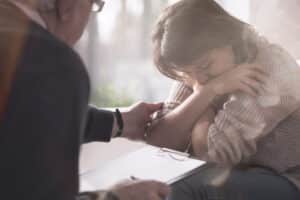Several movies in the past have portrayed agoraphobia as pale, blonde individuals who are afraid of sunlight. But anyone experiencing symptoms of agoraphobia knows that it extends far beyond fear of sunlight. Agoraphobia is a type of anxiety disorder where individuals fear or avoid people, places, or things that could result in feelings of panic, helplessness, or being trapped.
Water Gap Wellness Center is a mental health treatment center in Pennsylvania that offers treatment for anxiety and agoraphobia.
Agoraphobia Coping Skills
Agoraphobia coping skills look different for everyone, but you can learn several coping skills as part of your regular treatment.
Deep breathing
Deep breathing is a short version of meditation or mindfulness that helps you focus your thoughts on the present. Too often, when individuals get overwhelmed with anxiety, they start clavicular breathing, which is where the shoulders rise and fall, and the breathing comes from the clavicle area.
But clavicular breathing actually makes anxiety worse. This type of breathing can constrict how much oxygen you’re getting and lead to hyperventilation.
Deep breathing exercises where you breathe in through your nose and out through your mouth are one of the easiest skills to use in any situation to help ease anxiety.
Listening to something
For some people, coping with agoraphobia requires a way to block out other sounds. In public spaces, there can be lots of noises, from music playing overhead to cars to murmuring voices, and those sounds can be a trigger for people with agoraphobia.
To avoid anxiety and panic attacks, individuals can learn to regulate their senses by using things like noise-canceling headphones or listening to allowed songs or podcasts to block out the other noises.
Anxiety coloring books
Art therapy is extremely effective for any anxiety disorder, including agoraphobia. The best thing about art therapy is that research shows you don’t need any artistic skill for it to be useful.
Things like anxiety coloring books can help individuals use their hands when overwhelmed, facilitating tactile engagement and creativity while also forcing the mind to focus on the present. This causes the body and mind to relax because of the distraction. Keeping a small coloring book and a few colored pencils when you go out in public can be a viable coping skill.
Dealing with Agoraphobia Professionally
In some cases, symptoms are too severe for regular agoraphobia coping skills, and clients benefit most from professional help.
Therapies for Coping with Agoraphobia
Exposure Therapy
For some people, dealing with agoraphobia involves professional exposure therapy. Exposure therapy is when you work with a trained professional who gives you small, achievable goals. Your goals might be something like this:
- Sit in a parking lot
- Drive with a friend from that parking lot
- Driving to a coffee shop
With exposure therapy, a professional works with you as you progress through incremental exposure steps that allow you to ease into things that might have seemed out of reach before, like going to the grocery store. This type of therapy helps break a pattern of fear and avoidance.
Cognitive Behavioral Therapy
Cognitive behavioral therapy is another professional therapy that can help you challenge your thinking.
For example, you might think, “I am terrified that I will have a psychotic breakdown in public.”
And your therapist can help you change that thought into something like, “I am scared of having a psychotic break, but I have a plan to call my best friend to help ease my anxiety when I am in public.”
Cognitive behavioral therapy offers a chance to remind yourself that you have preparations, and in some cases, those preparations have proven useful. Knowing that you have preparations and can change your thoughts automatically gives you ease, especially when combined with other coping skills.
Water Gap Wellness Center offers several forms of flexible outpatient treatment for mental health disorders.
At our facility, you can step away from triggers in your environment and learn individualized coping skills that can be applied to your symptoms. We provide partial hospitalization programs, which last only a couple of weeks, intensive outpatient programs, which last several weeks, and regular outpatient programs for ongoing support after completing other treatments.
With several levels of care available, we can help you find a treatment plan that works best for your circumstances. When you reach out to our team, we can review your initial assessment, how we personalize plans to your needs, and how best to verify your insurance coverage.
Water Gap Wellness Center offers several forms of outpatient mental health services in NJ. If you are struggling with anxiety, we can help you receive customized care that integrates the type of holistic services, education, and therapy best for your circumstances.
Let Water Gap Wellness Center help you find ways to navigate your agoraphobia today.




